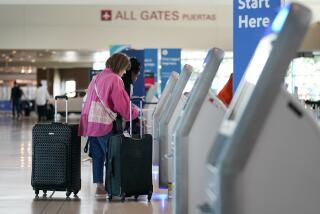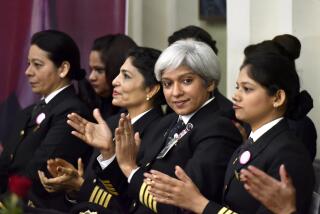Pilot Crunch Expected Within 3 to 5 Years
- Share via
Many U.S. airlines have placed a hold on the hiring and training of new pilots. It makes economic sense in an industry retrenching after several years of multimillion-dollar losses.
But those watching the hard-and-fast demographics see an entirely different picture.
According to numbers collected by a congressionally mandated panel looking into projected shortages of pilots, the cutbacks will haunt the industry.
“There will be a crunch in the next three to five years where we’re going to run out of well-experienced, qualified pilots,” said John Sheehan, vice president of a Washington aviation consulting firm advising the panel.
“Now that the industry has shut down hiring, it’s going to discourage people from going on to pursue a career in aviation,” Sheehan said.
With the mandatory retirement age of 60 as a key integer, an average of 2,400 airline pilots--a total of 23,000 by the year 2003--are expected to retire or quit each year through the next decade. Most of these pilots will have to be replaced.
If the industry climbs out of its current doldrums, another 45,000 new pilots will be needed by both the big commercial carriers and the commuter airlines.
Counting the projected needs of all sectors of the air-transport industry, including air-taxi services, corporate jet crews, agriculture pilots and flight instructors, about 160,000 new commercial pilots will be needed by the year 2004.
But the traditional pathways of flight training are narrowing. The shrinking of the military means 25% fewer pilots will be available for the civilian sector. Today’s dismal job prospects in commercial aviation have cut enrollment at aeronautic schools. The number of pilot certificates granted by the Federal Aviation Administration is off 20% over the last several years.
The FAA now issues 75,000 student pilot certificates annually; less than half complete the training to qualify as private pilots. Of that figure, about 14,000 receive commercial licenses annually.
Based on pure numbers, that would be enough to fill airline cockpits. But Sheehan notes that the level of experience will be down dramatically.
“There will never be a shortage of properly certificated pilots, but those certificates reflect minimum standards set out by the FAA,” he said, “not the standards airlines have required.”
More to Read
Inside the business of entertainment
The Wide Shot brings you news, analysis and insights on everything from streaming wars to production — and what it all means for the future.
You may occasionally receive promotional content from the Los Angeles Times.










